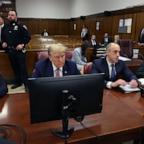Grateful Dead Goes Modern
M O R R I S O N, Colo., July 11 -- — For the past week, the spectacular natural amphitheater Red Rocks, carved out of the Rocky Mountains' front range near Denver, has played host to 10,000 people a night, attracted by the legendary Grateful Dead.
Actually, make that "The Dead." Since leader Jerry Garcia died in 1995, the band has renamed itself a couple of times. The group's fans are extremely loyal. "Deadheads" are known to follow the band across the country during its annual summer tour.
This year, they've added an attraction for the faithful. Lead singer and guitarist Bob Weir calls it an "experiment." Every concert is recorded and digitally transferred to compact discs that can be ordered at the concert venue and shipped within a week and a half.
It's like going to the same concert over and over again. And it could well be the future of album sales for "performance" bands like The Dead, for many reasons:
Cost: A three-CD set of a typical performance costs $22. Compare that to the usual $17 or $18 charged by music stores for a single disc.
Incentive for the performers: Most bands like The Dead receive less than $1 for each album sold. By controlling the recording and marketing of their work, they now earn up to $8 or $10 an album.
This means a band does not have to sell a million records to make a decent profit. It can sell far fewer. It also means that less "commercial" songs get recorded. Finally, it should encourage start-up bands that can't afford to record with a major label.
Back of the Bus CD Burning
A simple laptop computer with not-so-simple software is the key. Dennis Leonard, The Dead's audio mixer, who is nicknamed "Wizard," sits in a tiny room or even in the back of the band's bus, mastering the recorded tracks and storing them in digital files. He can "burn" a CD from his computer or collect the digitalized tracks and send them off to Chicago for duplication. It's that easy.
"They're much better than the free downloads from the Internet," said Leonard. "Online MP3 files are compressed and don't provide nearly the range as a CD."
Someday, he believes the recordings will be digitally downloaded from a machine at the concert site only moments after the last song has been played. Fans will actually be able to listen to the concert they just attended on their car audio system, driving home.
The faithful seem to like the idea. So far, about 25,000 CDs have been sold. That's about 2,000 for each performance during The Dead's summer tour. Do the arithmetic, and the band pockets a quarter-million dollars. Call it "supplemental income," as they have already earned most of their money from concert ticket sales. Tickets go for $52.50 a head — or Deadhead, that is.
The egalitarian breakthrough is not, however for every musical group. Some bands cannot survive outside a studio because members need audio sweetening, dubbed-over voice tracks and other tricks to sound presentable. But the technology is perfect for bands that thrive on interaction with their audiences. Jam bands such as Phish, the Allman Brothers Band and String Cheese Incident have all embraced the "road recordings."
‘Room for Both’
This does not mean that The Dead will prohibit private recordings of their concerts. For years, individuals have been allowed to set up their own microphones and tape recorders at Dead concerts and make personal recordings. In fact, the Grateful Dead actually encouraged the practice and reserved a special area for the recorders.
But the road-show CDs will easily compete with the homemade recordings because they are professionally recorded and mastered.
"There's room for both," said Cameron Sears, the CEO of The Dead. "We're not going to prevent people from doing that. We hope they appreciate the fact we're doing it and by supporting this avenue we're opening up other doors for things that could potentially unfold."
In the meantime, the band continues its summer tour while picking up pocket change. "We're turning some handsome coin here," said Weir.
"It's good for music, it's bad for a small corner of the whole music world — that being people who make money selling records — and I'm sorry for them," he said with a wink.
What a long, strange trip it's been … and continues to be for the iconic road band.




